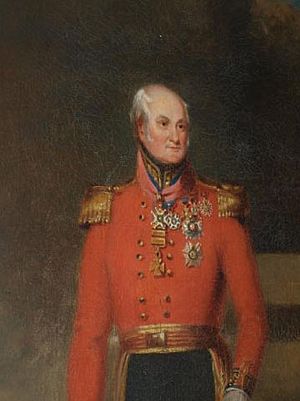Robert Arbuthnot (British Army officer) facts for kids
Quick facts for kids
Robert Arbuthnot
|
|
|---|---|
 |
|
| 16th General Officer Commanding, Ceylon | |
| In office 1839–? |
|
| Preceded by | John Wilson |
| Succeeded by | Colin Campbell |
| Personal details | |
| Born | 19 November 1773 Rockfleet Castle, County Mayo |
| Died | 6 May 1853 (aged 79) Hanover Lodge, Regent's Park |
| Spouses | 1 Susan Vesey (2) Harriet Smith |
| Relations | Son of John Arbuthnot of Rockfleet Castle; Brother of Rt Rev Alexander Arbuthnot and General Sir Thomas Arbuthnot and Charles Arbuthnot |
| Children | George Arbuthnot |
| Military service | |
| Allegiance | United Kingdom |
| Branch/service | British Army |
| Rank | Lieutenant-General |
| Unit | 76th Regiment of Foot |
| Commands | General Officer Commanding, Ceylon |
Sir Robert Arbuthnot (born 19 November 1773 – died 6 May 1853) was a brave British military leader. He played an important role during the Napoleonic Wars. He became a Lieutenant-General in the British Army and was a colonel of the 76th Regiment of Foot.
He also served as a brigadier general for Portugal. For his service, he received special awards like the Knight Commander of the Order of the Bath (KCB) and the Knight of the Tower and Sword from Portugal.
Sir Robert was recognized for his courage in many battles. He earned the Army Gold Cross for his actions in battles like Busaco, Albuera, and Toulouse. He also received the Military General Service Medal for battles such as Corunna.
Contents
Early Life and Family
Robert Arbuthnot was born in Rockfleet Castle, County Mayo, Ireland. He was the fourth son of John Arbuthnot Senior. His family was well-known, and his brothers also achieved important positions.
His brothers included Charles Arbuthnot, who was a politician, and Alexander Arbuthnot, who became a bishop. His other brother, Thomas Arbuthnot, also became a Lieutenant-General in the army.
Joining the Army
Sir Robert began his military career on 1 January 1797. He joined the 23rd Light Dragoons as a cornet, which was a junior officer rank. His first major action was in the Irish rebellion at the Battle of Ballinamuck in 1798.
Later, he served with his regiment when the British captured the Cape of Good Hope in 1806. He then went to South America. There, he worked as an aide to General William Beresford.
During his time in South America, he and his troops were captured. He remained a prisoner for 18 months. He was finally released as part of an agreement made by General John Whitelocke.
Service in the Peninsular War
After being released, Arbuthnot returned to General Beresford's staff. He served as his aide-de-camp and later as his military secretary. This was during most of the Peninsular War, a major conflict in Europe.
Key Battles and Achievements
Sir Robert fought in many important battles during his career. These included the Battle of Corunna and the battle of Busaco. He also helped during the Siege of Ciudad Rodrigo and the Battle of Albuera.
He was known for his bravery and quick thinking. In the Battle of Albuera, he rode between two regiments that were accidentally firing at each other. He stopped them without getting hurt.
In the same battle, he noticed the French army making a move that his commander, Marshal Beresford, had not seen. He quickly told Beresford, which helped prevent a mistake.
Awards and Promotions
For his courage and service, Sir Robert received many honors. He earned the Gold Cross with three clasps for his actions in several battles. These included Busaco, Albuera, and Toulouse.
He also received the War Medal with two clasps for Corunna and Ciudad Rodrigo. Portugal and Spain also gave him special awards. In 1815, he was made a Knight Commander of the Order of the Bath (KCB).
In 1830, he became a major-general. In 1838, he was put in charge of the troops in Ceylon (now Sri Lanka). He then commanded a division in Bengal. He was promoted to lieutenant-general in 1841. In 1843, he became the colonel of the 76th Foot regiment.
Family Life
Sir Robert Arbuthnot was married twice. His first wife was Susan Vesey. They married in Belfast in 1802. Susan passed away in 1822.
He later married Harriet Smith in 1826. They did not have children together. Sir Robert had a son named George Arbuthnot from his first marriage.
Images for kids
 | Misty Copeland |
 | Raven Wilkinson |
 | Debra Austin |
 | Aesha Ash |


